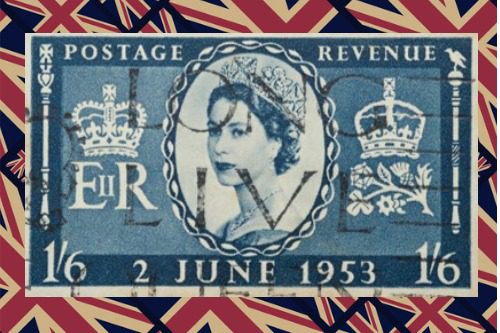Aviva archives show insurance evolution since Queen Elizabeth came to the throne

Home insurance provided cover for “thunderbolt”, “larceny” and “tempest”Typewriters, glass and chinawear items were specifically excluded from travel insuranceDamage to properties by cattle and horses were grouped together with damage by motor vehiclesA home contents checklist included a piano, lino, servants’ goods and “sundries”
As the Platinum Jubilee weekend approaches, Aviva has looked back to 1952 to see how insurance has evolved since Her Majesty The Queen came to the throne.
While many core features have remained the same, records from the Aviva archives provide insights into the changing face of homes, hobbies, vehicles and holidays over the last seven decades.
Home buildings insurance in 1952
Aviva documents show comprehensive household insurance offered protection against events still seen today, such as fire, burglary and storms – although some of the 1952 policy wording has fallen out of favour, including “thunderbolt”, “larceny” and “tempest”.
Interestingly, damage caused by flood, subsidence or landslip was excluded. All three risks are now covered by Aviva home insurance. The insurer uses risk-mapping technology to assess the likelihood of flooding and typically deals with hundreds of flood claims in the UK each year.
Properties were covered against damage caused by motor vehicles, as they are today, although impacts from road vehicles were grouped together with damage from horses and cattle – presumably a more common sight on the roads of 1952.
Home contents insurance in 1952
Aviva heritage brand Norwich Union provided “private dwelling insurance” which covered a customer’s possessions – similar to modern home contents insurance.
A helpful checklist allowed customers to keep track of their belongings. The list included popular possessions of the day including a piano, radio, television, food stocks, lino, servants’ goods, jewellery and “sundries”.
Customers were also offered an optional add-on of glass cover, to include glass in greenhouses, fanlights, verandas, conservatories and outbuildings. Claims of this variety were subject to a £1 excess – equivalent to around £31* today. The policy also covered accidents to servants, as well as their clothing and personal goods.
Tech cover in 1952: wireless and television installation policy
Seventy years ago, “wireless” (radio) and television installation insurance was available for households fortunate enough to own such tech. The policies covered loss or damage to the wireless or television set – apart from the outside aerial.
Cover extended to accidental death or injury caused by these devices to any person not belonging to the household. However, as is still the case with home insurance today, the policy did not cover wear and tear or mechanical failure.
Specialist insurances: golf, brass bands and shop fronts
Aviva’s heritage companies also offered a number of specialist insurance policies for very specific types of cover. These included golf insurance, cover for brass and military bands and insurance for glass shop fronts.
Golf insurance enabled people to claim for loss or damage “not exceeding £50” (equivalent to around £1,531 today) – for golf clubs and bags. It also provided cover for clubs broken while practising, and accidental injury / death (to the insured person) while on a golf course.
Brass band insurance covered instruments, uniforms, music, music stands, cups and trophies.
Motor insurance in 1952
Motor insurance became mandatory in 1930 and had evolved as vehicles became increasingly common, although according to the Department for Transport, back in 1952, less than 30% of distance travelled in Britain was by car, van or taxi. Forty-two per cent was by bus or coach, and 17% by train.
A motor insurance policy offered in 1952 by General Accident, now a part of Aviva, covered many similar risks to those seen today, including third party indemnity, accidents, and loss or damage to the car.
A separate section on the policy scheduled also specified that the customer would be covered for loss or damage to “rugs, coats, luggage, medical or surgical instruments by accidental means or by fire, theft or larceny”.
However, the policy excluded money, jewellery, gold or silver articles, travellers’ samples, tools or books. A separate motor policy offered by Road Transport and General – another Aviva heritage company – covered against loss or damage due to frost, riot and civil commotion, but not earthquake.
Travel insurance in 1952
While today Aviva’s travel insurance offers protection against Covid-related risks, as well as cancellation cover and medical expenses, in 1952, insurance for travellers was more focused on personal accidents and baggage.
One policy offered cover for those enjoying “camps, tours and excursions at home and abroad”. Baggage was covered against loss or damage by “pilferage” and “sea water” as well as fire, theft, loss and “other accident or misfortune”.
However, there were exclusions applied for trinkets, watches, gold and silver articles, field glasses, cameras, and “valuable laces”, while an excess was applied for China, glass, typewriters and musical instruments – perhaps more commonly taken on holiday in 1952!
Similar to the winter sports add-ons of today, certain sports were only covered against accidents by special arrangement. These included motorcycling, mountaineering, winter sports and flying (other than as a fare paying passenger on a regular airline).
Anna Stone, Group Archivist for Aviva says: “The core facets of insurance have remained the same since Her Majesty The Queen came to the throne, but there are some fascinating developments which are tracked through our archives.
“Our documents from 1952 reveal a world where TVs were luxuries and therefore benefitted from their own insurance; cattle and horses were more common on UK roads and it wasn’t unheard of to take a typewriter on holiday.
“Our insurance products today cover electric vehicles, mobile phones, laptops and e-bikes, items that might have been unimaginable at the time of the Coronation. Who knows what we can expect for homes, vehicles and holidays in another 70 years!”
Authored by Aviva



